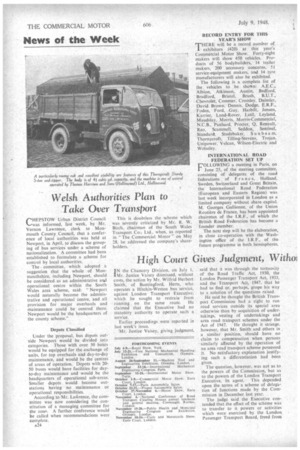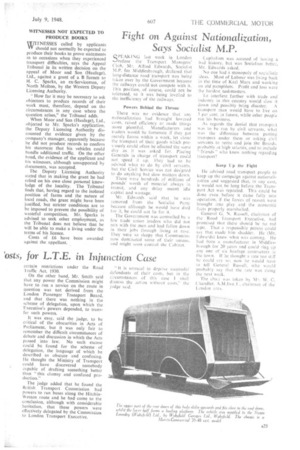High Court Gives Judgment, Withoi 'osts, for L.T.E. in Injunction Case
Page 26

Page 27

If you've noticed an error in this article please click here to report it so we can fix it.
I N the Chancery Division, on July 1, Mr. Justice Vaisey dismissed, without costs, the action by Mr. Wilfrid Herbert Smith, of Buntingford, Herts, who operates a Hitchin-Weston bus service, against London Transport Executive, which he sought to restrain from running on the same route, He claimed that the Executive had no statutory authority to operate_ such a service.
Earlier proceedings were reported in last week's issue.
Mr. Justice Vaisey, giving judgment, said that it was through the tortuosity of the Road Traffic Act, 1930, the London Passenger Transport Act, 1933, and the Transport Act, 1947, that he had to find or, perhaps, grope his way to a solution of the questions raised.
He said he thought the British Transport Commission had a right to run road services outside its special area otherwise than by acquisition of undertakings, vesting of undertakings and area road transport schemes under the Act of 1947. He thought it strange, however, that Mr. Smith and others in a similar position, should have no claim to compensation when persons similarly affected by the operation of an area road transport scheme possessed it. No satisfactory explanation justifying such a differentiation had been given.
The question, however, was not as to the powers of the Commission, but as to the powers of the London Transport . Executive, its agent. This depended upon the terms of a scheme of delegation of functions made by the Commission in December last year, The judge said. the Executive contended that the effect of the scheme was to transfer to it powers or activities which were exercised by the London Passenger Transport Board, freed from certain restrictions under the Road '1 raffic Act, 1930.
On the other hand, Mr. Smith said that any power the Commission might have to run a service on the route in question was not derived from the London Passenger Transport Board, and that there was nothing in the scheme of delegation, upon which the Executive's powers depended, to transfer such powers.
It was easy, said the judge, to be critical of the obscurities in Acts of Parliament, but it was only fair to remember the difficult circumstances of debate and discussion in which the Acts passed into law. No such excuse could be found for the scheme of delegation, the language of which he described as obscure and confusing. He thought the Ministry of Transport could have discovered somebody capable of drafting something better than "this clumsy and confused production."
The judge added that he found the British Transport Commission had powers to run buses along the HitchinWeston route and he had come to the conclusion, although with considerable hesitation, that these powers were effectively delegated by the Commission to London Transport Executive.
It is unusual to deprive successful defendants of their costs, but in the circumstances of this case I shall dismiss the action without costs," the judge said.




















































































